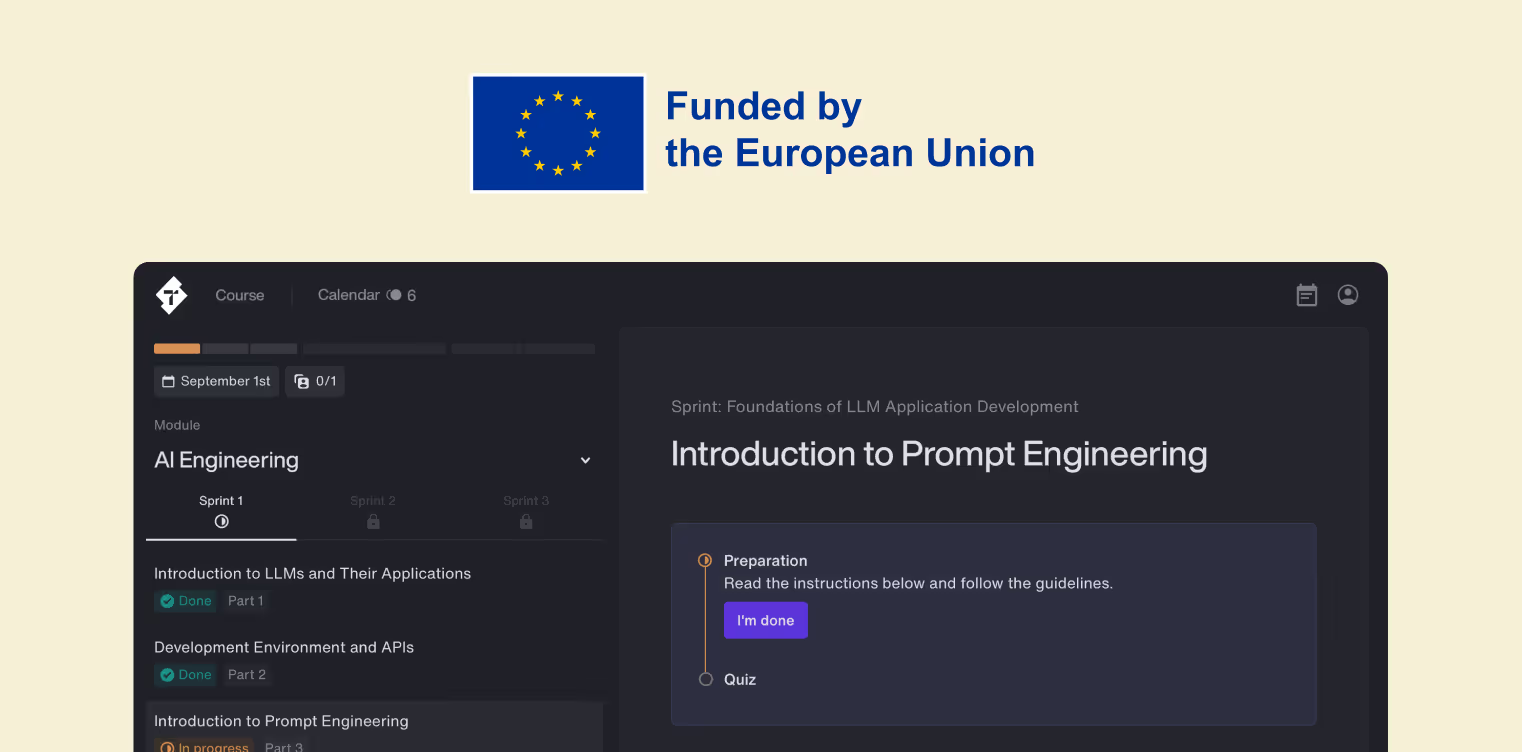Our mentors bring first-hand experience from companies and universities such as:







The companies and institutions mentioned have no institutional affiliation or official partnership with Turing College.
“Practical projects and 1:1 mentorship equipped me with skills in demand by employers, setting me apart in the workplace.”
Take the next step in your data science career
Our program is designed to provide you with the skills, experience, and confidence you need to succeed in data science.
What can you expect?
Learn by doing:
Complete ~15 real-life data science projects, each reviewed by a seasoned data scientist and a peer.
Learn the tools and languages
you need to kick off your data science career:
Choose from two in-demand specializations:
Become job-ready
and get a certificate to prove it.
Überblick & Inhalte (Python, Machine Learning, KI)
Im Fokus stehen Python-Programmierung, Datenaufbereitung (Pandas, NumPy), Machine-Learning-Algorithmen (scikit-learn, PyTorch, XGBoost) und statistische Verfahren. Darüber hinaus lernst du Computer Vision und Natural Language Processing kennen – zwei Schlüsselgebiete, wenn du tiefer in das Thema KI einsteigen willst. So wirst du umfassend auf deine zukünftige Rolle als Data Scientist vorbereitet.
Praxisprojekte & Spezialisierungen (Computer Vision, LLMs)
Praktische Projekte
Ob Bildklassifikation für autonome Fahranwendungen oder das Erstellen von Chatbots mithilfe großer Sprachmodelle (LLMs) – du wendest dein Wissen direkt in realen Szenarien an.
Spezialisierung
Wähle zwischen Computer Vision oder LLM-Engineering (z. B. GPT, BERT, T5). So kannst du dich auf den KI-Bereich fokussieren, der dich besonders begeistert.
Python für KI lernen – Online-Kurs mit Zertifikat
Du erhältst nicht nur theoretisches Wissen, sondern auch ein Abschlusszertifikat, das deine praktischen Fähigkeiten im Umgang mit modernen KI-Technologien belegt.
Program outline
Our program, created by senior data scientists, is focused on helping you get hired and apply your skills from day one after graduation.
Data wrangling with Python
Learn Python from the ground up and master data processing and visualization with NumPy, Pandas, and other libraries. You’ll get hands-on experience with essential tools for data analysis with Python to prepare for more advanced data-driven tasks.
Statistical inference
Enhance your knowledge of statistics by diving into probability, statistical inference, A/B tests, and causal inference. Gain the skills to create and test experimental hypotheses and understand statistical models. Learn SQL to work effectively with data in relational databases.
Machine learning
Learn to use various supervised and unsupervised machine learning models, such as KNNs, decision trees, random forests, support vector machines, gradient boosted trees, XGBoost, LightGBM, K-Means clustering, and more. Learn the underlying concepts behind today's most popular generative AI models like ChatGPT.
Computer vision (AI specialization)
Explore computer vision, starting with digital image processing and advancing to image classification and detection/segmentation. Use libraries like PIL, NumPy, and OpenCV, and master CNN architectures such as AlexNet and ResNet with PyTorch. Apply your skills in practical projects, building models for quality assurance, image labeling, and self-driving cars.
Natural Language Processing (AI specialization)
Master the fundamentals of NLP by starting with text preprocessing, tokenization, and representation techniques. Explore advanced text analysis using deep learning models like BERT, GPT, and T5. Apply your skills to practical tasks, including sentiment analysis, text classification, and named entity recognition, while leveraging pre-trained models to solve real-world challenges effectively.
Individual specialization modules
Work on our hiring partners’ projects and build an internship-level portfolio.
Graduate in 12 months or less: you set the pace
With our program, you have the power to set your own pace. By dedicating 15 hours of focused learning per week, you can graduate in 12 months. The more hours you can dedicate to learning, the faster you’ll graduate.



Build a portfolio that proves your skills to employers
The best way to learn data science is through hands-on experience with real data. That’s why you’ll complete up to 15 practical projects and build an interview-ready portfolio you can proudly show to potential employers.
While working on your capstone project, you will:
Identify a client’s business problem
Acquire, wrangle, and explore relevant data
Use machine learning or other advanced techniques to make predictions
Create real-world business impact through data storytelling
Direct your work towards the industry that interests you most
Examples of projects
Use image recognition to build a model for self-driving cars.
Build a model to predict bank clients’ credit risk and serve it into production.
Use LLMs to create a chatbot to quickly retrieve information from a car manual.
Use machine learning to create a model that predicts stroke risk in patients.
Learn from experts who are 100% up‑to‑date with the industry trends

Kickstart your new career
We don’t make empty job promises. Instead, we focus on what actually works: real-world skills, personalized career support, and a strong portfolio that shows employers what you can do.
Lorem ipsum dolor sit amet, consectetur adipiscing elit. Suspendisse varius enim in eros elementum tristique.




























A unique learning experience powered by technology
Online learning is tough when you’re left on your own. That’s why we built Intra, our learning platform that combines the best of both worlds: human support and smart structure. We’re also developing adaptive AI features to further personalize learning so that, in the future, your journey will adjust closely to your pace, needs, and progress.


97%*
Employment rate
40+
Learner nationalities
1000+
Active students
*Job-qualified graduates received an offer and were employed within 6 months of graduation.
How application works
Our application process consists of three steps:
Application
You’ll complete an application form, sharing your personal and academic background with us.
Video/audio recording
You’ll record your answers to a few questions so we can assess whether the Data Science program is the right fit for you. Don’t worry – you don’t need to prepare much. You’ll have time to think through your answers and you can re-record if needed. We’ve implemented and certified this step to ensure we admit the most suitable candidates.
Interview
You’ll have a short interview call with our admissions manager to make sure you’ll get the most out of the program.
Basic admission requirements:
15-30 focused hours/week
Focused hours are:
- Working on a computer (not a smartphone)
- Uninterrupted working time in a dedicated space
- Rested, not overworked (not after intense cognitive work)
Strong motivation
You need a clear and strong reason for joining this program. It should be your personal goal, and you should have specific reasons for wanting to improve your skills.
Good English skills
You must demonstrate an English proficiency of at least B2 level to join the program.
Up-to-date computer
You’ll need a computer that can handle large datasets smoothly and runs an actively supported and updated operating system.
Flexible financing options
Upfront payment
Best for
Learners who want the lowest total price by paying upfront
Course duration
Flexible, 8-12 months
Time commitment
15+ h per week
Price
Installments
Best for
Learners who prefer to split self-payment into monthly installments
Course duration
Flexible, 8-12 months
Time commitment
15+ h per week
Price
50% scholarship
Best for
Top 5% high-potential learners
Course duration
Flexible, 8-12 months
Time commitment
15+ h per week, special conditions may apply
Price
We have limited seats. Apply now!
Starting dates
April 7th
Deadline for applications:
2026-03-31
Our graduates have achieved life changing growth. You can too.

Turing College has been a great experience. I loved the structure and content of the material. I had constant contact with instructors and peer learners. I find the peer and senior review concept really efficient.
FAQ
How likely am I to get the EU resident scholarship?
Your chances of receiving the scholarship depends on several factors:
- Residency. You must live in the European Union.
- Performance in the interview. You need to demonstrate a strong drive to learn and grow, both during the program and in your future career.
- Commitment. You should have a clear intention to work full-time in a related industry after completing the program. You also have to be able to dedicate at least 20 hours per week to your studies.
- Competition. The scholarship is awarded to the top 5% of applicants. Your chances of receiving the scholarship will depend on the performance of other applicants in the interview process.
If you meet the residency requirement, showcase your potential and commitment during the interview, and rank among the top 5% of applicants, you will have a good chance of receiving the scholarship. However, please keep in mind that the competition is really high.
What salary can I expect after graduating?
The salary you can expect after completing our program depends on a few key factors:
- Location. For example, salaries for the same position tend to be higher in Silicon Valley compared to Lithuania due to differences in cost of living, demand, and other factors.
- The position you’re aiming for. It's all about aligning your skills and experience with the role you're seeking.
- Your experience and skills. The more you can showcase your value, the better your chances of securing a competitive salary.
- Interview performance and negotiation skills. How you perform and answer interview questions can influence the initial offer you receive. Plus, your final salary will also depend on how well you navigate the negotiation process after the interview.
Salaries in Europe and elsewhere
If you’re interested in working in another European country, we recommend starting with Glassdoor’s base pay calculator. Choose the relevant country or city to get an idea of the salary range for your desired position.
Keep in mind that base pay estimates can be off by up to 20% because they average out junior, mid, and senior positions. Despite this margin of error, these estimates can still help you identify reasonable offers. Aim for a salary close to the base pay level and don’t feel pressured to accept offers that fall more than 20% below the base salary in a particular country.
How does Turing College help me get a job?
We're not just here to teach you the skills you need to succeed – we're also committed to helping you launch your career and secure your dream job! Here are three ways we support our learners:
- Endorsement. Our endorsement program is designed to give you a real-world experience of the hiring process from start to finish. We'll guide you through optimizing your LinkedIn profile, structuring your GitHub projects, getting interview questions right, and applying for jobs in a systematic way.
- Referrals to hiring partners. Once you’re endorsed by Turing College, we’ll recommend you to our hiring partners, who are always on the lookout for talented specialists.
- Referrals from our network. Our mentors come from companies like Tesla, Google, IBM, and Vinted. When they see your skills and potential, they can refer you directly to their companies. In most cases, a referral from them is your ticket straight to the interview stage.
What if I haven’t heard from Turing College within 24 hours of applying?
If it's been more than 24 hours since you submitted your application and you haven't received a response from us, here's what you can do:
- Check your spam/promotions folder. Sometimes our emails can get lost, so take a look to see if our message ended up there by mistake.
- Reach out to us via live chat. You’re already on our website, so click on the chat button at the lower right-hand corner of your screen. Our friendly team is always ready to help you out and make sure your application gets the attention it deserves.
In what cases can I lose my scholarship, and do I need to pay it back?
Our scholarship terms are designed to attract dedicated learners who are passionate about careers in data analytics. To keep your scholarship, here are a few things to keep in mind:
1. Job search and hiring conditions:
a. During your studies and for one month after you graduate, you’ll need to inform Turing College before applying to any company (including our hiring partners). This way, we can give you personalized advice and support to help you find the perfect opportunity. One month after graduation, you’re free to apply anywhere without checking with us.
b. If one of our hiring partners offers you a job that meets your expectations (we'll provide you with the salary range beforehand), we expect you to accept it unless you have a good reason not to. An example of a good reason would be you accepting another offer from a hiring partner or some unexpected requirements like relocation being added to the offer.
2. Keeping up with your learning pace:
For you to graduate from Turing College in a reasonable timeframe, we define a minimum learning pace requirement. We have seen that only by maintaining a consistent pace can students successfully graduate from Turing College. The minimum learning speed for students who receive a 100% scholarship are as follows:
- For our Data Science program, your average learning speed should not be slower than completing a sprint in 3-4 weeks on average. This equates to finishing 3 modules in 9-11 months;
- For our Data Analytics program, you should complete 4 modules in 8-10 months.
- For our Digital Marketing & Analytics program, your graduation is expected within 6-10 months.
Violating one of these conditions will lead to termination of your scholarship. If a scholarship is terminated, you will need to return the full amount of the scholarship you have received. We implement these scholarship terms to ensure we attract students who are serious about pursuing careers in a related field to their program.
How likely am I to get a full scholarship?
Your chances of receiving a full scholarship depend on several factors:
- Motivation: You need to show strong motivation to create AI-driven solutions, either within your company or as part of your own startup.
- Commitment: You must have a clear intention to work full-time in the tech field or create your own startup after completing the program. Additionally, you need to dedicate at least 15 hours per week to your studies.
- Competition: Scholarships are awarded to the top 20 candidates. Your chances depend on how many applications we receive and how your performance in the interview compares to others.
















